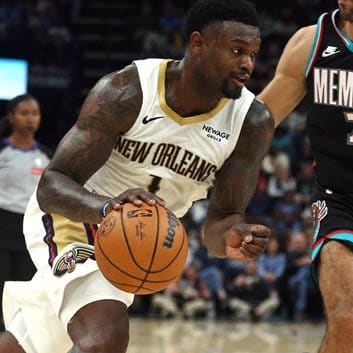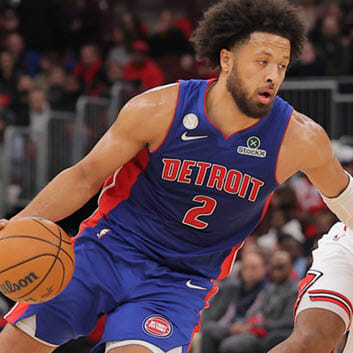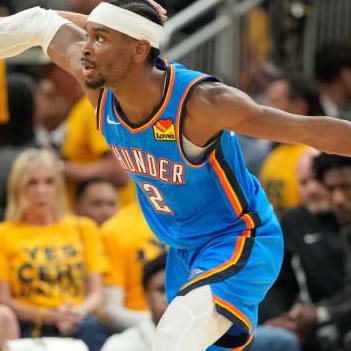The NBA's regular season is winding down with slightly more than three weeks to go. We'll continue to enjoy DFS for awhile after that, but for me, the fantasy sports energy has started to shift. Was it because I was on vacation last week? Away again this past weekend? It's been a blur of a month. Some of my attention has been diverted to MLB, some to my seasonal keeper team...Yes, that ill-fated last place keeper team in which I was auto-drafted Ersan Ilyasova in the first round (I wrote bitterly about it a couple months ago) made the playoffs and just enjoyed a relaxing bye week as the two seed. Dropping Ilyasova was just one of the fun moves I made to get here. Looking forward to a very competitive semifinal this week!
As far as NBA DFS goes, I've been playing pretty low volume. The drastic loss in research time -- both stat monitoring and game watching -- that goes along with traveling has made it really hard to stick with my usual routines. Not surprisingly, I've been on a cold streak to rival this relentless NY winter. So I've been thinking a lot about streaks this week.
What is a streak? One way to define it is as an unbroken string of like performances. I also think of it as a pattern. Human beings love their patterns. We count on patterns all the time in our everyday lives, and this drive stems from the historic need to understand our environment in order to survive. In the distant past, what had happened most recently was often the best predictor of what should happen next. We now have the ability to manipulate our environment to the extent that being in tune with it and its patterns is no longer necessary for our survival. Yet we still search out and cling to the patterns all around us.
Behavior is controlled by activity in the brain. Ancestral pressures that drove our brains to operate in certain ways may have disappeared, but the brain still works in those same ways. One consequence of this is that we're built to identify (and potentially profit from) repeated performances. Moreover, we use a small number of repeated performances to make fairly extravagant conclusions about future returns.
When we have identified and believe in the patterns around us, we tend to use less actual information to make decisions. If a snippet of what we see, hear, or touch fits the pattern, we can make a judgment without taking the time or effort to experience the full nature of whatever it is. This can be advantageous, allowing us to save our resources for other pursuits that may require more brain power. Instincts and first impressions are really just your brain taking a shortcut to a conclusion based on superficial cues that match previous experience. The brain is an economist's dream, operating with enviable efficiency and maximum profitability...in theory. In fact, Neuroeconomists study these exact phenomena to help better understand investment behavior, which is subject to many of the same cognitive issues as daily fantasy sports players' behavior.
After a full season of NBA, I'd like to think that I have some idea of what's going on with teams and players. Wouldn't you? I think that's fair. So when losing touch with the pulse of the NBA over the past month forced me to bank on my perceived patterns more than usual, I wasn't super worried. Sure, I'm using snippets of data rather than the full daily picture. Headlines instead of game logs. Highlights instead of watching games. But if patterns exist, if they can be relied upon, shouldn't that be enough? Well, apparently not, given my dismal track record over the last two weeks.
I have two possible explanations. First, the other, less discussed March Madness is the sudden unpredictability of the NBA at this point of the season. Teams in the playoffs as well as teams with no chance for a postseason run are breaking the patterns. Stars are getting more rest, new rotations are being tested with an eye on playoff matchups, and rookies and new acquisitions are being evaluated in different roles before the offseason. For any number of very good basketball reasons, teams are running out less predictable lineups for fantasy purposes. That means that what makes sense in terms of the past no longer predicts the future as well as it used to.
Second, the patterns weren't that reliable to begin with. There is evidence that we create our patterns, beliefs and predictions, with a degree of laziness. We are subject to Recency Bias in a big way - for better or worse. In some cases, the sample size used to generate patterns has to be small. For example, Dion Waiters' recent hot streak only exists because Kyrie Irving (biceps) has been out. But even when a hot streak has some logical basis, past performance is no guarantee of future outcome. It's one of the most ignored truths in sports or investments. It's always been profitable (historically) to "bet" on the patterns, on the streaks we observe, so we continue to do it. When it works, our Outcome Bias (the one that rewards us for outcomes that aren't necessarily due to our own actions - read more about this in my book, Cognitive Bias in Fantasy Sports here) credits the process of trusting the pattern to make decisions, so we are more likely to consider it again in the future. On the other hand, Outcome and other biases do a good job of attributing misses and errors in judgment to factors other than our own actions, so we don't blame the pattern we saw and relied upon for our failure.
Data from sports and investment trends alike suggest that what we perceive as patterns might simply be due to chance. Many people don't believe in momentum, either from a seasonal or in-game point of view. Where attempts have been made to examine it, the data confirms that not only is momentum nearly impossible to measure, but people don't even agree on what constitutes it in a given game. It's not something on which you want to base DFS lineup decisions (see related ideas in my Chasing Points article).
This month may have been especially tough for me, being out of the country or at least out of town so often, but this time of year seems to be tough on everyone. A lot of top DFS players I know are playing reduced volume right now, because the unpredictability I describe above creates variability and an element of chance that no longer favors the skills of the prepared. Being aware of these factors, and especially being cautious about relying upon established patterns to make decisions, can help you eek out a little more profit as the NBA season winds down. You need to stay even more attuned to the daily, hourly, and up-to-the-tip news to be fully prepared. You can't take anything for granted. So enjoy the home stretch, and as always, good luck in all your games!




































